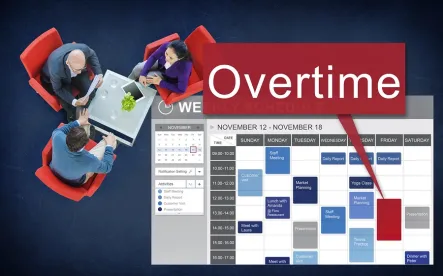The New York State Department of Labor (NYSDOL) has issued sweeping proposed regulations addressing worker scheduling practices that will affect most employers in the state (though employers covered by the Hospitality Wage Order — hotels and restaurants — are not covered by the current proposed regulations).
The proposed regulations on predictive scheduling will require employers, among other things, to provide “call-in pay” (ranging from two to four hours at the minimum wage) if:
- Employers do not provide non-exempt employees 14 days’ advance notice of their work shift;
- Employers cancel employee shifts without at least 14 days’ advance notice;
- Employers require employees to work “on-call”; or
- Employers require non-exempt employees to report to work but then send them home.
The proposed regulations provide several exceptions to some or all of its requirements. These include an exception for workers who earn more than 40 times the minimum wage (e.g., $600 a week for those employed by “large” employers in New York City) and an exception relating to work impacted by weather. The regulations also do not apply to workers who are excluded generally from coverage under the amended wage orders (e.g., executive, administrative, and professional employees) or those covered by a collective bargaining agreement that provides for call-in pay.
The proposed regulations amend the wage order covering miscellaneous industries and occupations (which encompasses most employers other than restaurants and hotels and includes non-profit entities that have not opted out of wage order coverage).
The proposed regulations are expected to be published in the New York State Register on December 12, 2019. The public will have 30 days (until January 11, 2019) to submit comments. There is no deadline for the NYSDOL to issue final regulations, but it is expected that they will be issued in early 2019.
Background
The NYSDOL issued its first round of proposed regulations more than a year ago, following Governor Andrew Cuomo’s direction in September 2017 to hold public hearings on employee scheduling laws. Proposed regulations were issued in response to concerns that certain practices (i.e., shift cancellations, unscheduled shifts, and on-call responsibilities) create difficulty for employees with childcare, school, and family commitments, or employees who are juggling multiple jobs. In the Governor’s press release first announcing the need for regulations, for example, the Governor stated that some employers treat employees like “integers in an algorithm, allowing employers to adjust staffing levels in real time, calling workers in to meet unexpected customer demand, and sending them home early when store traffic is light.”
Show-Up Pay
Under the proposed regulations, if an employee reports to work and is sent home, the employer must pay the non-exempt employee at least four hours (at the minimum wage), unless the employee is scheduled to work less than four hours, in which case, the employer must pay the employee for the number of hours the employee is scheduled to work.
New York law already requires four hours of pay at the minimum wage for those who report to work, but not if the employee’s regular rates are sufficiently above the minimum wage so that the amount earned by the employee in excess of the minimum wage is more than the show-up pay required. The proposed regulations, however, eliminates that exception, and covered employees, regardless of their wage rate, will be entitled to show-up pay if they report to work and are sent home.
Unscheduled Shifts
Under the proposed regulations, if employees are required to work a shift that has not been scheduled at least 14 days in advance of the shift, the employee will be entitled to an additional two hours of call-in pay at the minimum wage. Thus, employers no longer will be permitted to require employees to work additional shifts without 14 days’ advanced notice without additional pay.
Canceled Shifts
Employees whose shifts are canceled without at least 14 days’ notice must be paid two hours of “call-in pay” at the minimum wage. Those whose shifts are canceled with less than 72 hours’ notice must be paid four hours of “call-in pay” at the minimum wage. Thus, employers no longer will be permitted to instruct employees not to come to work because business is slow or they are overstaffed without additional pay to employees.
On-Call Shifts
Employees who are required to be “on-call” (i.e., available to report to work) must be paid four hours of “call-in pay” at the minimum wage.
Call For Schedule
An employee who is required to be in contact with the employer within 72 hours before the start of the shift to confirm whether to report to work also must be paid four hours of “call-in pay” at the minimum wage.
Exceptions
The proposed regulations provide a series of exclusions from these new requirements, some broader in scope than others. Exclusions include the following:
- Employees subject to a collective bargaining agreement that “expressly provides for call-in pay” are not covered.
- Employees who earn more than 40 times the minimum wage during the week are excluded from most of the new requirements (but not the requirement for show-up pay).
- Employees whose duties are directly dependent on weather conditions, whose duties are necessary to protect the health or safety of the public or any person, or whose assignment are subject to work orders or work order cancellations also are excluded from the new requirements (other than the new version of the preexisting Show-Up Pay requirement). The regulations do not provide further details regarding who this would cover; presumably, sanitation workers who plow snow, workers who work on the beach, and construction workers who are unable to work due to weather conditions or customer changes would be among those covered.
- Employees who volunteer for an unscheduled shift are excluded from the Unscheduled Shift requirement, and the regulation lays out the framework for a process to document voluntariness in this regard.
- Individuals who do not meet the regulations’ definition of “employee” remain excluded from the predictive scheduling requirement.
Safe Harbor
The proposed regulations also have a new “safe harbor” provision not contained in the original proposed regulations that allows an employer to assign an employee to cover a shift without additional call-in pay for an “unscheduled shift” if employer provides a good faith estimate of scheduled hours to employees upon hiring and if: (1) the request to cover the new or previously scheduled shift is either made by the employee whose shift would be covered; or (2) is made by the employer in a written communication to a group of employees requesting a volunteer from among the group and identifying a reasonable deadline for responses.
New York City Employers
The regulations do not expressly discuss the impact of these state regulations on already-implemented laws also governing predictive scheduling such as the NYC Fair Workweek Law. Moreover, in some instances, there are conflicting terms. For example, the NYC Fair Workweek Law prohibits certain retail employers from requiring employees to work on-call, while the proposed regulations merely impose a penalty for such.
Next Steps
Covered employers should begin a thorough review of their policies on compensation and staffing to determine the impact the proposed regulations may have on scheduling policies and the potential additional costs that might result from the regulations, both in increased payments to workers and costs of administration. In doing so, employers should also carefully analyze the exceptions.








 />i
/>i
